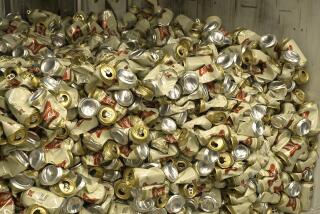S. African Trade Brouhaha Once Again Uncorked
- Share via
JOHANNESBURG, South Africa — At the signing in October of a long-awaited trade deal between this nation and the European Union, South Africa’s top trade official cracked a joke when the bubbly was uncorked.
“This is unnamed liquid we are drinking,” quipped Alec Erwin, the minister of trade and industry.
Erwin was poking fun at one of the thorniest issues during four years of negotiations: the naming of alcoholic beverages produced in South Africa. At one point, disagreement about South Africa’s use of the Portuguese and Spanish labels “port” and “sherry” nearly upended the talks.
Four months later, Erwin isn’t laughing, the $17-billion-a-year trade deal is on the rocks and, once again, the contentious issue is South African alcohol bearing European names.
This time, Italy and Greece object to South Africa’s use of “grappa” and “ouzo” to label liqueurs. The two European countries regard the terms as solely theirs. Unless they get their way, the Italians and Greeks are threatening to sink the trade package, which took provisional effect Jan. 1 but must be ratified by the EU’s 15 member-states to stay on the books.
“South Africa is not a country that can be bullied into accepting the irrational,” an angry Erwin reported to Parliament this week. “We call on the EU to come to their senses and regain our respect.”
But the dispute about grappa (which is made in Italy from distilled grape skins) and ouzo (an anise-flavored liqueur in Greece) has far deeper meaning than the peculiar names might suggest. Indeed, South African distillers don’t even produce ouzo, and grappa production amounts to fewer than 30,000 bottles a year in a market of many millions. The country’s biggest grappa winery has even offered to surrender the name if doing so would save the trade pact.
It probably wouldn’t, analysts say. The impasse has grown bigger than the two after-dinner drinks, touching upon South African sensitivities, European politics and international trade precedent.
South African negotiators are increasingly fed up with the Europeans, who have promised a trade deal ever since the country’s first democratic elections in 1994 but have repeatedly missed deadlines and demanded new concessions. The EU is South Africa’s biggest trading partner, accounting for about 40% of its exports and 70% of its foreign direct investment. But because of its apartheid past, South Africa was left out of the EU’s preferential trade pacts with other African countries.
The October agreement, which liberalizes about 90% of trade and extends economic development and other assistance, was intended to reward South Africa for its peaceful transition to black-majority rule. Instead, some South Africans complain, it has become a symbol of the developed world’s arrogance. A study by the United Nations Conference on Trade and Development concluded last year that the trade pact would hurt more than help South Africa’s balance of trade and tariff revenues.
The Europeans, meanwhile, are saying little publicly about the troubles, but it appears that the Italians and Greeks are exploiting EU political divisions. The two countries are miffed that EU negotiators resolved the sherry and port disputes in the main trade deal but left grappa and ouzo for separate talks. The EU foreign ministers are scheduled to meet Monday in a last-ditch effort to sort out the squabbling.
“I think it communicates a bad message about the Europeans,” South African President Thabo Mbeki recently told reporters about the infighting.
The South Africans are being quietly nudged on by the United States and other big trading partners who, along with them, fear that concessions on grappa and ouzo would invite trade disputes on thousands of products internationally.
The South Africans agreed to stop using the labels port and sherry--which will be phased out over the next five years--only because they refer to geographic place names. Similarly, South African wineries decades ago dropped “champagne,” a region in France, from labels on sparkling wines. But grappa and ouzo are considered “traditional expressions,” in world trade jargon, which have no history of such exclusivity.
“We are not willing to resolve the grappa and ouzo issues in the same way as port and sherry,” said Edwin Smith, a spokesman with the Ministry of Trade and Industry. “At the end of the day you would have people wanting protection for ‘hamburger’ and ‘pizza.’ ”
More to Read
Sign up for Essential California
The most important California stories and recommendations in your inbox every morning.
You may occasionally receive promotional content from the Los Angeles Times.













